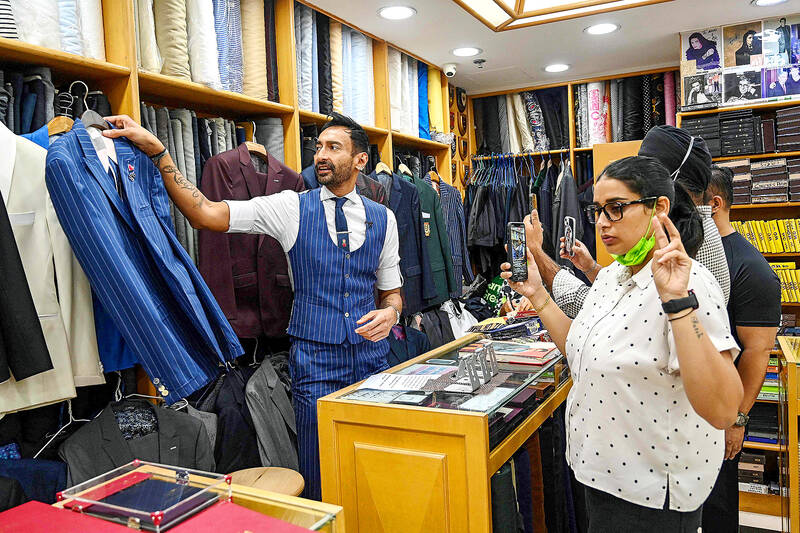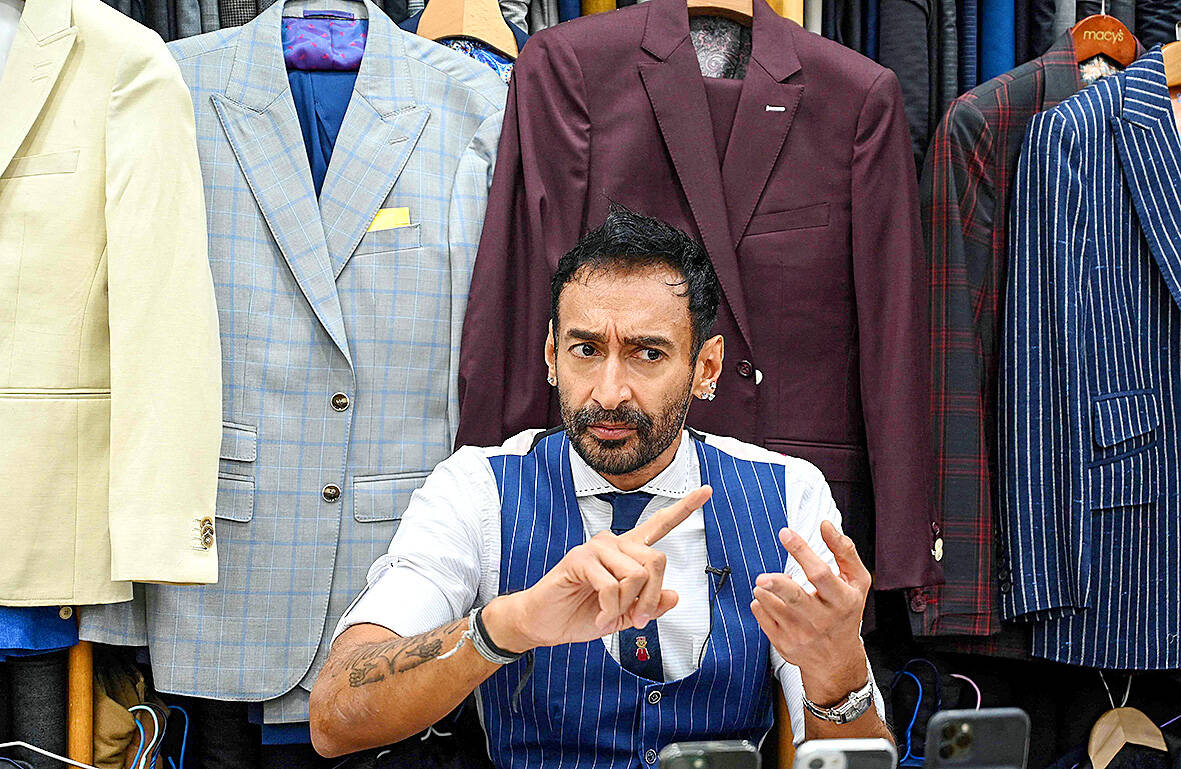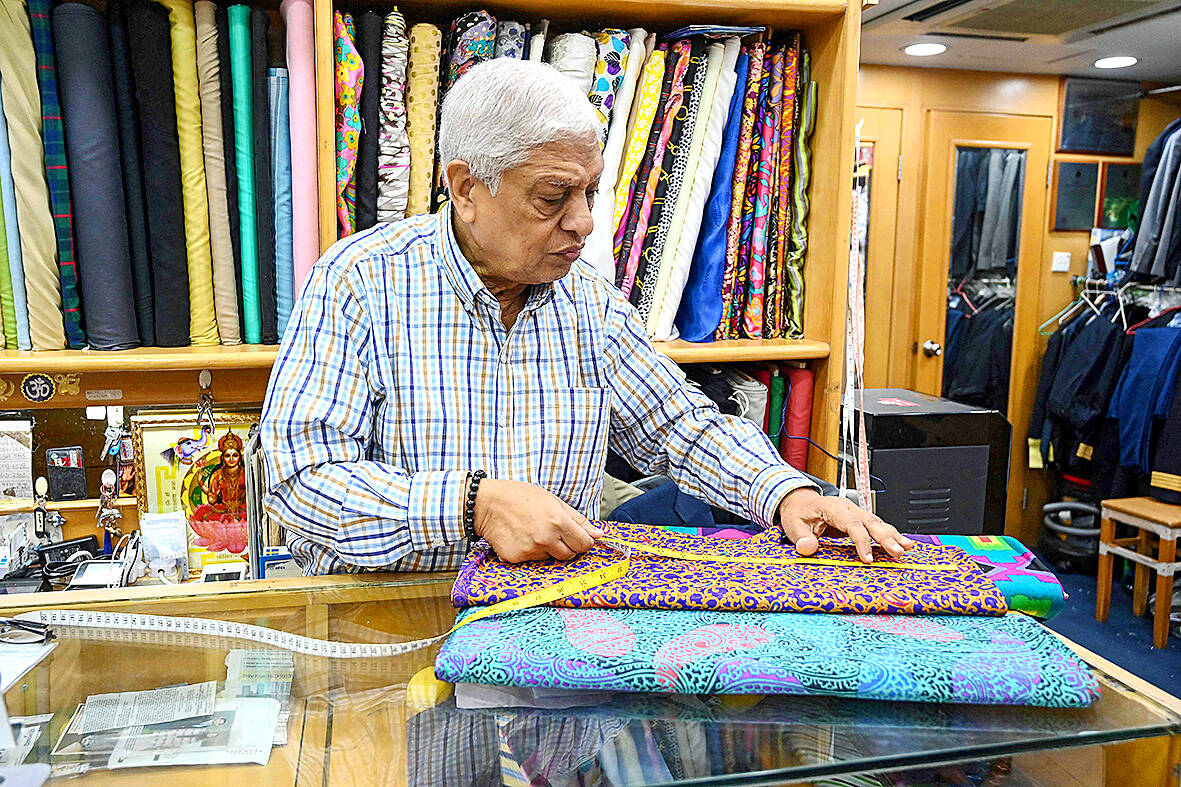Assistants wielding multiple livestreaming mobile phones are now as crucial to Roshan Melwani’s tailor shop as the measuring tapes, needles and fabrics that have made his Hong Kong family business so famous.
The Melwani family has dressed everyone from American presidents to aristocrats and celebrities over the decades. But the pandemic nearly sunk them — and many of Hong Kong’s once thriving tailoring businesses have not survived.
Few places remained internationally cut-off during the coronavirus pandemic for as long as Hong Kong, a self-imposed isolation that the city’s government has only begun to lift in the last two months.

Photo: AFP
As a result, Melwani’s shop Sam’s Tailors has been reliant on online sales for most of the last 2.5 years, long after rivals in Saville Row, Milan and New York reopened their doors.
“Understand that if I did not have 60 years of cash behind me, I could not operate,” Melwani, a third-generation tailor, says as a frenetic day of video calls with customers and livestreams to showcase new designs gets underway.
“Pre-pandemic I had a minimum 20 people that I would work with per day, sometimes 40 people, up to six days a week.”

Photo: AFP
QUALITY AND SPEED
Tim, a client in the US, is the kind of customer that has helped keep Sam’s Tailor afloat. During the pandemic, he ordered an entire new wardrobe and now he’s on the look-out for something more daring.
With the help of assistants broadcasting a dizzying array of choices over video call, Melwani steers Tim towards a burgundy three-piece with an inner lining featuring pin-up girls.

Photo: AFP
“Yeah, let’s get to it,” Tim says over the phone as assistants frantically jot down all the extra details in yellow notebooks.
Before the pandemic Hong Kong’s tailors were a must-visit for many tourists thanks to their reputation for quality — and their ability to turn a bespoke suit around as little as 24 hours.
The walls of Sam’s Tailors are festooned with photos of famous patrons, from Bill Clinton, George Bush and Boris Johnson, to Bruno Mars, Russel Crowe and Meghan Markle. The city’s tailoring scene traces its origins back to Shanghai, which was renowned for its quality and craftmanship at the start of the twentieth century.
Many of those tailors relocated to Hong Kong in the aftermath of the Chinese Communist Party’s civil war victory in 1949.
“People can get 10 suits in Hong Kong with the frequency they get one suit in Saville Row,” said Andy Chan, President of the Hong Kong Tailors Association.
“This is why everybody came to Hong Kong to get a custom-made suit for them.”
TOURIST DESERT
In recent years Hong Kong’s tailoring industry has struggled against fast fashion and online sales. But the pandemic has been especially brutal.
Hong Kong went from welcoming 65 million people in 2018 to just 91,000 last year at the height of the pandemic, when all overseas arrivals had to pay for hotel quarantine of up to three weeks.
“We estimate for these four years (2018-2021) we had over 40 percent of the tailors that shut down,” Chan lamented.
Hong Kong only scrapped mandatory hotel quarantine in September, long after rival hubs like Singapore had reopened to the world. Even after that the city was still restricting where tourists could go for the first three days after arriving as they waited for test results, a measure that was removed earlier this month.
Roshan Melwani says there are times he feels angry but he tries not to dwell. “You think it doesn’t hurt my father, all his years of saving money, all that cash gone?” he said. “I don’t have time to feel that hurt, I have to devote my time to taking us forward.”

Growing up in a rural, religious community in western Canada, Kyle McCarthy loved hockey, but once he came out at 19, he quit, convinced being openly gay and an active player was untenable. So the 32-year-old says he is “very surprised” by the runaway success of Heated Rivalry, a Canadian-made series about the romance between two closeted gay players in a sport that has historically made gay men feel unwelcome. Ben Baby, the 43-year-old commissioner of the Toronto Gay Hockey Association (TGHA), calls the success of the show — which has catapulted its young lead actors to stardom -- “shocking,” and says

The 2018 nine-in-one local elections were a wild ride that no one saw coming. Entering that year, the Chinese Nationalist Party (KMT) was demoralized and in disarray — and fearing an existential crisis. By the end of the year, the party was riding high and swept most of the country in a landslide, including toppling the Democratic Progressive Party (DPP) in their Kaohsiung stronghold. Could something like that happen again on the DPP side in this year’s nine-in-one elections? The short answer is not exactly; the conditions were very specific. However, it does illustrate how swiftly every assumption early in an

Inside an ordinary-looking townhouse on a narrow road in central Kaohsiung, Tsai A-li (蔡阿李) raised her three children alone for 15 years. As far as the children knew, their father was away working in the US. They were kept in the dark for as long as possible by their mother, for the truth was perhaps too sad and unjust for their young minds to bear. The family home of White Terror victim Ko Chi-hua (柯旗化) is now open to the public. Admission is free and it is just a short walk from the Kaohsiung train station. Walk two blocks south along Jhongshan

Francis William White, an Englishman who late in the 1860s served as Commissioner of the Imperial Customs Service in Tainan, published the tale of a jaunt he took one winter in 1868: A visit to the interior of south Formosa (1870). White’s journey took him into the mountains, where he mused on the difficult terrain and the ease with which his little group could be ambushed in the crags and dense vegetation. At one point he stays at the house of a local near a stream on the border of indigenous territory: “Their matchlocks, which were kept in excellent order,